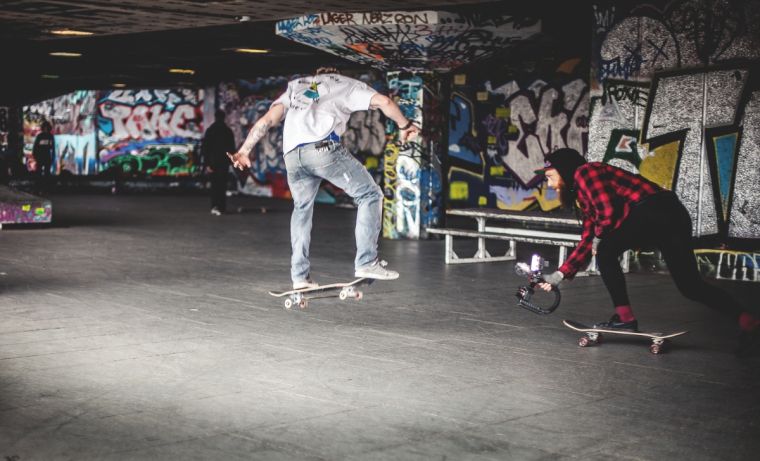Does anyone care about young people in this election?

In the last election 57 per cent of 18-24 year olds didn't vote. I'm not sure I blame them.
A generation of young voters are growing up in vulnerable times, facing increasing daily pressures. From the press coverage of the election which I've seen, as someone relatively engaged, I haven't seen much which has given weight to the reality of young people's situation in 2017.
A plethora of issues face today's 18-24 year olds: lack of decent, affordable housing, uncertain job prospects and rising debts. They are also looking at a more fragile planet; it's this generation that will be living with the full impact of climate change.
Cuts to crucial services as well as benefits, and the closure of many youth services are hitting the youngest the hardest. These cuts have been linked to last year's rise in violent crime across the country. In London alone, gun crime rose by 42 per cent and knife crime was up by almost a quarter; it's undeniable that many of those caught up in the fallout of this violence will be young people.
But, it's a catch-22 situation, the less young people turn out to vote, the less weight is given to their voices; the more politicians ignore issues affecting their young constituents, the more likely it is they'll stay away from the polling stations.
A lack of interest in politics isn't just about apathy and ignorance. And it's not that the manifestos disregard young people entirely; some policies are obviously directed at them. Yet, I can't see that the youth turnout will be much higher in June than in previous recent elections. Dr James Sloam states on his election analysis website that back in the early 90s more than 60 per cent of young people voted. In the last three elections the average has been 40 per cent. That's a serious decline over just a couple of decades. There are deeper issues at play.
Behind every young person who doesn't turn up to vote is a story. A series of consequences that led them to feel that politics isn't for them; a disempowering narrative that ensures they believe that even if they did to choose to vote, it won't make any difference to their lives. In addition, the way politicians dress, talk and behave doesn't seek to make connections with young adults. Campaigning doesn't speak a millennial or gen Y language, and rarely are young people empowered to shape how politics could work in the future.
Young voters did turn out in vastly higher numbers for last year's referendum. With 75 per cent voting to remain in the EU, they may well be disgruntled that their voices are being ignored in this Brexit-obsessed election. Whatever your views on Britain's exit from the EU, young people's opinions need to be voiced and heard. We can not let the words of young people just disappear; all our futures depend on them.
In 1 Timothy 4:12, Paul writes to his protegé, 'Don't let anyone look down on you because you are young, but set an example for the believers in speech, in conduct, in love, in faith and in purity.' His words are both instruction and prophecy: young people often end up at the bottom of the pile but Paul is saying to them, fight against this, show them who you can be. Like the political world, the Church can easily silence the voice of its younger members. Young people can be seen as too radical and inexperienced in congregations made up mostly of older generations. Distrust can develop between the age groups. Young people can be viewed as not caring much because of sporadic attendance, or as rebellious if they disagree with the main swarm of opinion. In our churches we can forget the crucial role young people have to play. It's about more than occasionally letting them read a bible passage or asking them how much it rained at the summer festival they attended. Just like in politics, it needs to go further than a few manifesto pledges to get them on board, but mobilising them as leaders to be the ones to speak to their generation.
Churches, like the political world, are seeing a mass exodus of young people and millennials. A recent study revealed that for every person brought up in a non-religious household who becomes a churchgoer, 26 raised as Christians now identify as non-believers. We can't ignore what is happening. Connections need to be made with how young people are made to feel in our services and elections; with their lack of interest in them. If they haven't been included in decision making and leadership, if they've been patronised or belittled, why would they bother turning up?
Serious attention from both politicians and church leaders needs to be given to young people. In an election which feels insular in tone and at times irrelevant even to keen voters, surely we need to do more to grab the attention of young voters.
With the deadline to register to vote just days away, we could listen to some young adults we know about why they do or don't vote before lecturing them on the subject. At the same time, a dialogue with local representatives might allay our fears; perhaps they are doing more than we think to reach out to young voters - maybe they need some help with their communication style. How could young people get involved with their campaign?
The potential of the young generation of voters is huge; they could turn the world upside down. Let's not let them slip away.
'Young people, when informed and empowered, when they realise that what they do truly makes a difference, can indeed change the world.' - Jane Goodall
Katherine Maxwell-Rose is a writer, speaker and activist campaigning on issues of social justice and transformation. She is on Twitter @katherinemaxi











